Leadership: Characteristics, Motives, and Traits of Mahatma Gandhi
VerifiedAdded on 2022/12/15
|9
|1842
|134
AI Summary
This report discusses the characteristics, motives, and traits of Mahatma Gandhi as a leader. It explores his approach, effectiveness, and the impact he had on India's fight for independence. The report also delves into different leadership styles and the role of a leader in inspiring and empowering others.
Contribute Materials
Your contribution can guide someone’s learning journey. Share your
documents today.

LEADERSHIP
Secure Best Marks with AI Grader
Need help grading? Try our AI Grader for instant feedback on your assignments.
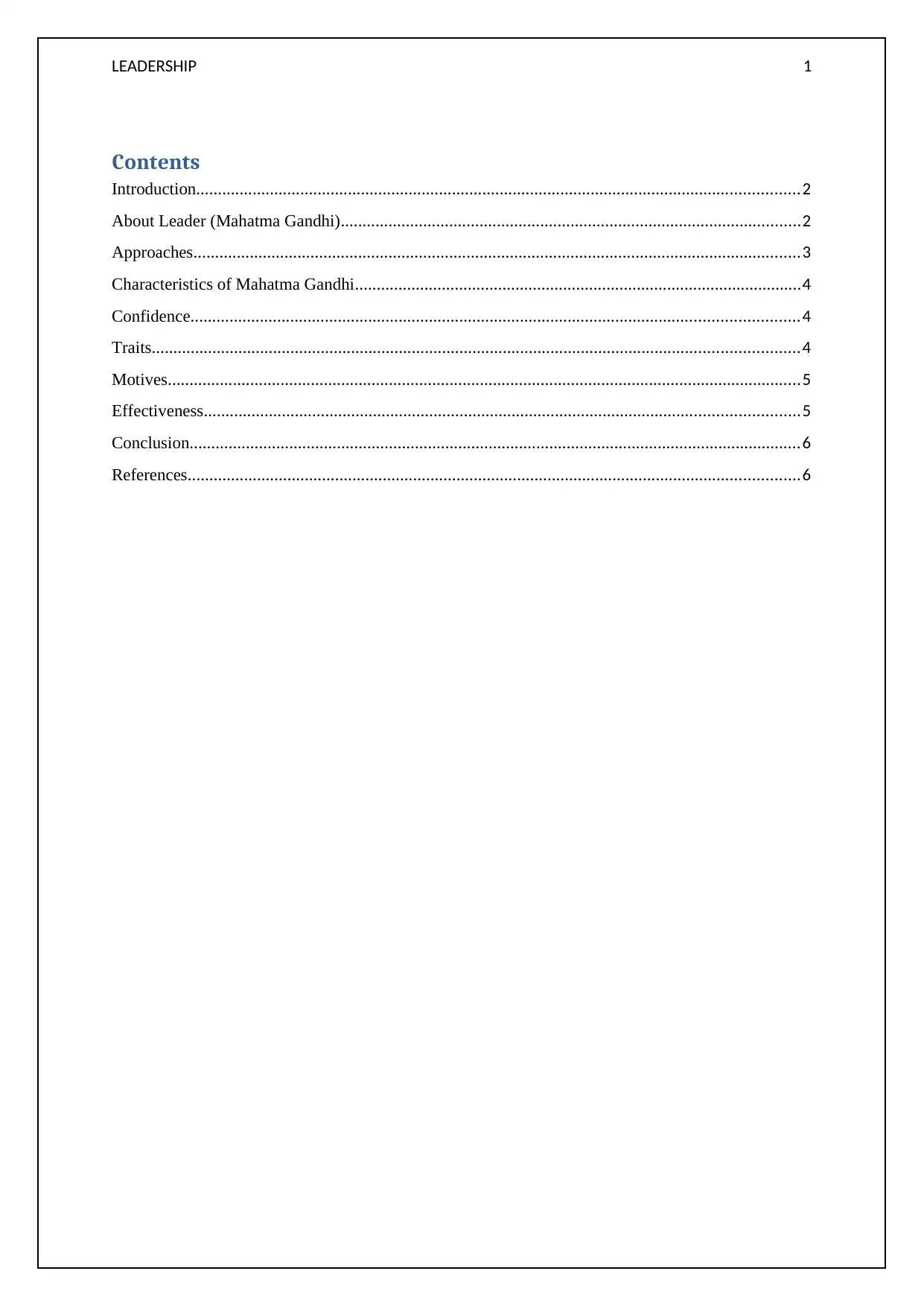
LEADERSHIP 1
Contents
Introduction...........................................................................................................................................2
About Leader (Mahatma Gandhi)..........................................................................................................2
Approaches............................................................................................................................................3
Characteristics of Mahatma Gandhi.......................................................................................................4
Confidence............................................................................................................................................4
Traits.....................................................................................................................................................4
Motives..................................................................................................................................................5
Effectiveness.........................................................................................................................................5
Conclusion.............................................................................................................................................6
References.............................................................................................................................................6
Contents
Introduction...........................................................................................................................................2
About Leader (Mahatma Gandhi)..........................................................................................................2
Approaches............................................................................................................................................3
Characteristics of Mahatma Gandhi.......................................................................................................4
Confidence............................................................................................................................................4
Traits.....................................................................................................................................................4
Motives..................................................................................................................................................5
Effectiveness.........................................................................................................................................5
Conclusion.............................................................................................................................................6
References.............................................................................................................................................6
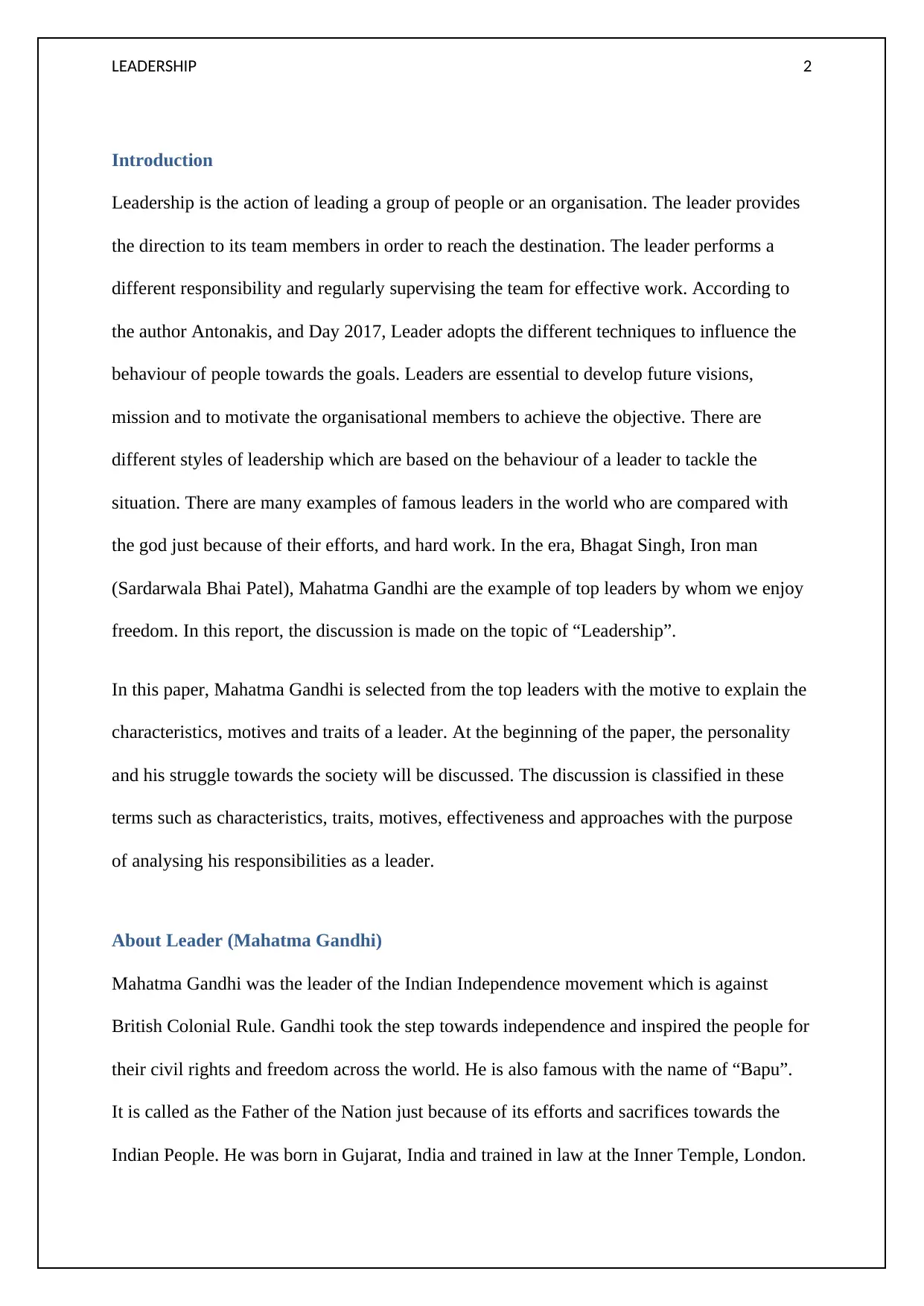
LEADERSHIP 2
Introduction
Leadership is the action of leading a group of people or an organisation. The leader provides
the direction to its team members in order to reach the destination. The leader performs a
different responsibility and regularly supervising the team for effective work. According to
the author Antonakis, and Day 2017, Leader adopts the different techniques to influence the
behaviour of people towards the goals. Leaders are essential to develop future visions,
mission and to motivate the organisational members to achieve the objective. There are
different styles of leadership which are based on the behaviour of a leader to tackle the
situation. There are many examples of famous leaders in the world who are compared with
the god just because of their efforts, and hard work. In the era, Bhagat Singh, Iron man
(Sardarwala Bhai Patel), Mahatma Gandhi are the example of top leaders by whom we enjoy
freedom. In this report, the discussion is made on the topic of “Leadership”.
In this paper, Mahatma Gandhi is selected from the top leaders with the motive to explain the
characteristics, motives and traits of a leader. At the beginning of the paper, the personality
and his struggle towards the society will be discussed. The discussion is classified in these
terms such as characteristics, traits, motives, effectiveness and approaches with the purpose
of analysing his responsibilities as a leader.
About Leader (Mahatma Gandhi)
Mahatma Gandhi was the leader of the Indian Independence movement which is against
British Colonial Rule. Gandhi took the step towards independence and inspired the people for
their civil rights and freedom across the world. He is also famous with the name of “Bapu”.
It is called as the Father of the Nation just because of its efforts and sacrifices towards the
Indian People. He was born in Gujarat, India and trained in law at the Inner Temple, London.
Introduction
Leadership is the action of leading a group of people or an organisation. The leader provides
the direction to its team members in order to reach the destination. The leader performs a
different responsibility and regularly supervising the team for effective work. According to
the author Antonakis, and Day 2017, Leader adopts the different techniques to influence the
behaviour of people towards the goals. Leaders are essential to develop future visions,
mission and to motivate the organisational members to achieve the objective. There are
different styles of leadership which are based on the behaviour of a leader to tackle the
situation. There are many examples of famous leaders in the world who are compared with
the god just because of their efforts, and hard work. In the era, Bhagat Singh, Iron man
(Sardarwala Bhai Patel), Mahatma Gandhi are the example of top leaders by whom we enjoy
freedom. In this report, the discussion is made on the topic of “Leadership”.
In this paper, Mahatma Gandhi is selected from the top leaders with the motive to explain the
characteristics, motives and traits of a leader. At the beginning of the paper, the personality
and his struggle towards the society will be discussed. The discussion is classified in these
terms such as characteristics, traits, motives, effectiveness and approaches with the purpose
of analysing his responsibilities as a leader.
About Leader (Mahatma Gandhi)
Mahatma Gandhi was the leader of the Indian Independence movement which is against
British Colonial Rule. Gandhi took the step towards independence and inspired the people for
their civil rights and freedom across the world. He is also famous with the name of “Bapu”.
It is called as the Father of the Nation just because of its efforts and sacrifices towards the
Indian People. He was born in Gujarat, India and trained in law at the Inner Temple, London.
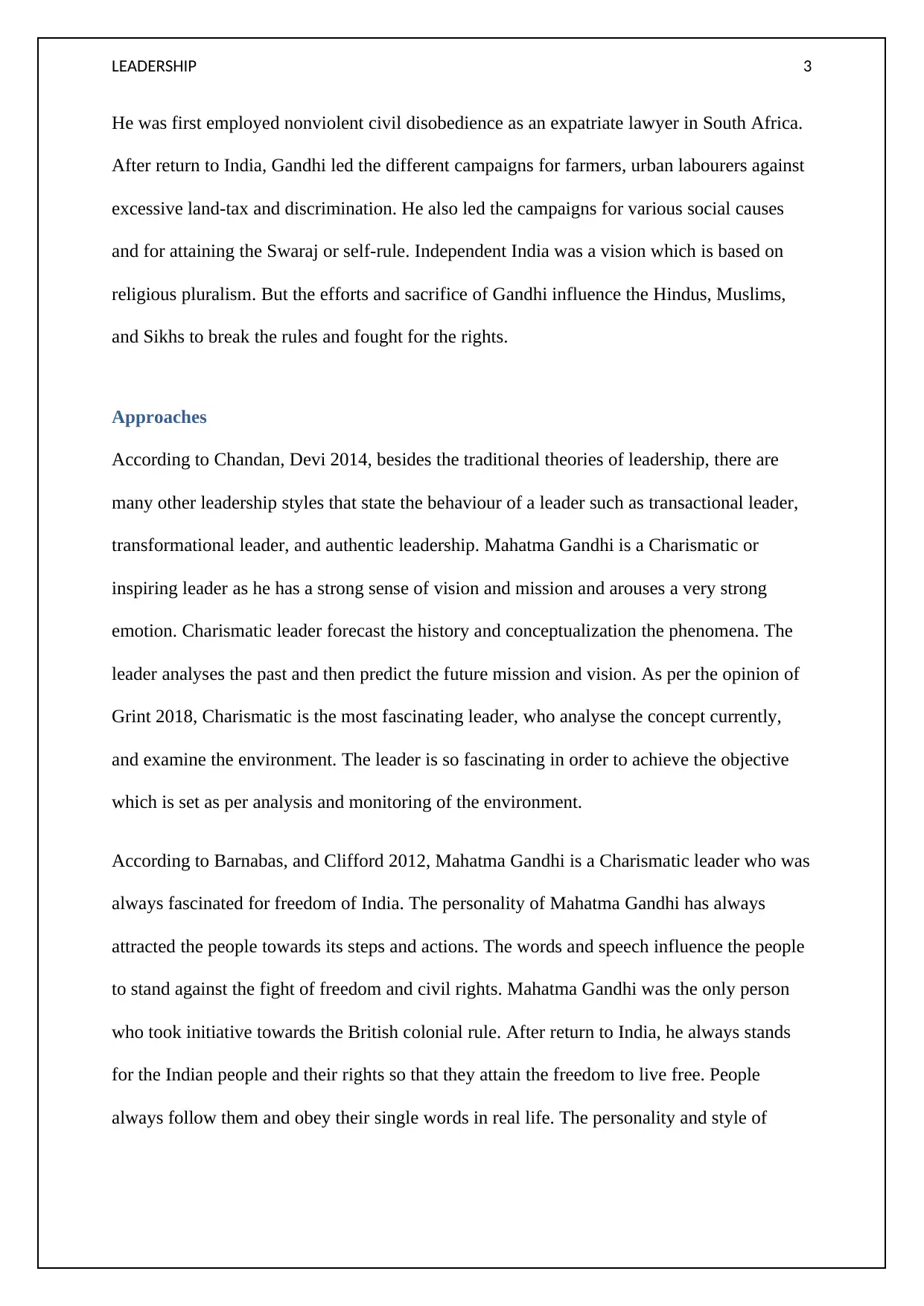
LEADERSHIP 3
He was first employed nonviolent civil disobedience as an expatriate lawyer in South Africa.
After return to India, Gandhi led the different campaigns for farmers, urban labourers against
excessive land-tax and discrimination. He also led the campaigns for various social causes
and for attaining the Swaraj or self-rule. Independent India was a vision which is based on
religious pluralism. But the efforts and sacrifice of Gandhi influence the Hindus, Muslims,
and Sikhs to break the rules and fought for the rights.
Approaches
According to Chandan, Devi 2014, besides the traditional theories of leadership, there are
many other leadership styles that state the behaviour of a leader such as transactional leader,
transformational leader, and authentic leadership. Mahatma Gandhi is a Charismatic or
inspiring leader as he has a strong sense of vision and mission and arouses a very strong
emotion. Charismatic leader forecast the history and conceptualization the phenomena. The
leader analyses the past and then predict the future mission and vision. As per the opinion of
Grint 2018, Charismatic is the most fascinating leader, who analyse the concept currently,
and examine the environment. The leader is so fascinating in order to achieve the objective
which is set as per analysis and monitoring of the environment.
According to Barnabas, and Clifford 2012, Mahatma Gandhi is a Charismatic leader who was
always fascinated for freedom of India. The personality of Mahatma Gandhi has always
attracted the people towards its steps and actions. The words and speech influence the people
to stand against the fight of freedom and civil rights. Mahatma Gandhi was the only person
who took initiative towards the British colonial rule. After return to India, he always stands
for the Indian people and their rights so that they attain the freedom to live free. People
always follow them and obey their single words in real life. The personality and style of
He was first employed nonviolent civil disobedience as an expatriate lawyer in South Africa.
After return to India, Gandhi led the different campaigns for farmers, urban labourers against
excessive land-tax and discrimination. He also led the campaigns for various social causes
and for attaining the Swaraj or self-rule. Independent India was a vision which is based on
religious pluralism. But the efforts and sacrifice of Gandhi influence the Hindus, Muslims,
and Sikhs to break the rules and fought for the rights.
Approaches
According to Chandan, Devi 2014, besides the traditional theories of leadership, there are
many other leadership styles that state the behaviour of a leader such as transactional leader,
transformational leader, and authentic leadership. Mahatma Gandhi is a Charismatic or
inspiring leader as he has a strong sense of vision and mission and arouses a very strong
emotion. Charismatic leader forecast the history and conceptualization the phenomena. The
leader analyses the past and then predict the future mission and vision. As per the opinion of
Grint 2018, Charismatic is the most fascinating leader, who analyse the concept currently,
and examine the environment. The leader is so fascinating in order to achieve the objective
which is set as per analysis and monitoring of the environment.
According to Barnabas, and Clifford 2012, Mahatma Gandhi is a Charismatic leader who was
always fascinated for freedom of India. The personality of Mahatma Gandhi has always
attracted the people towards its steps and actions. The words and speech influence the people
to stand against the fight of freedom and civil rights. Mahatma Gandhi was the only person
who took initiative towards the British colonial rule. After return to India, he always stands
for the Indian people and their rights so that they attain the freedom to live free. People
always follow them and obey their single words in real life. The personality and style of
Secure Best Marks with AI Grader
Need help grading? Try our AI Grader for instant feedback on your assignments.
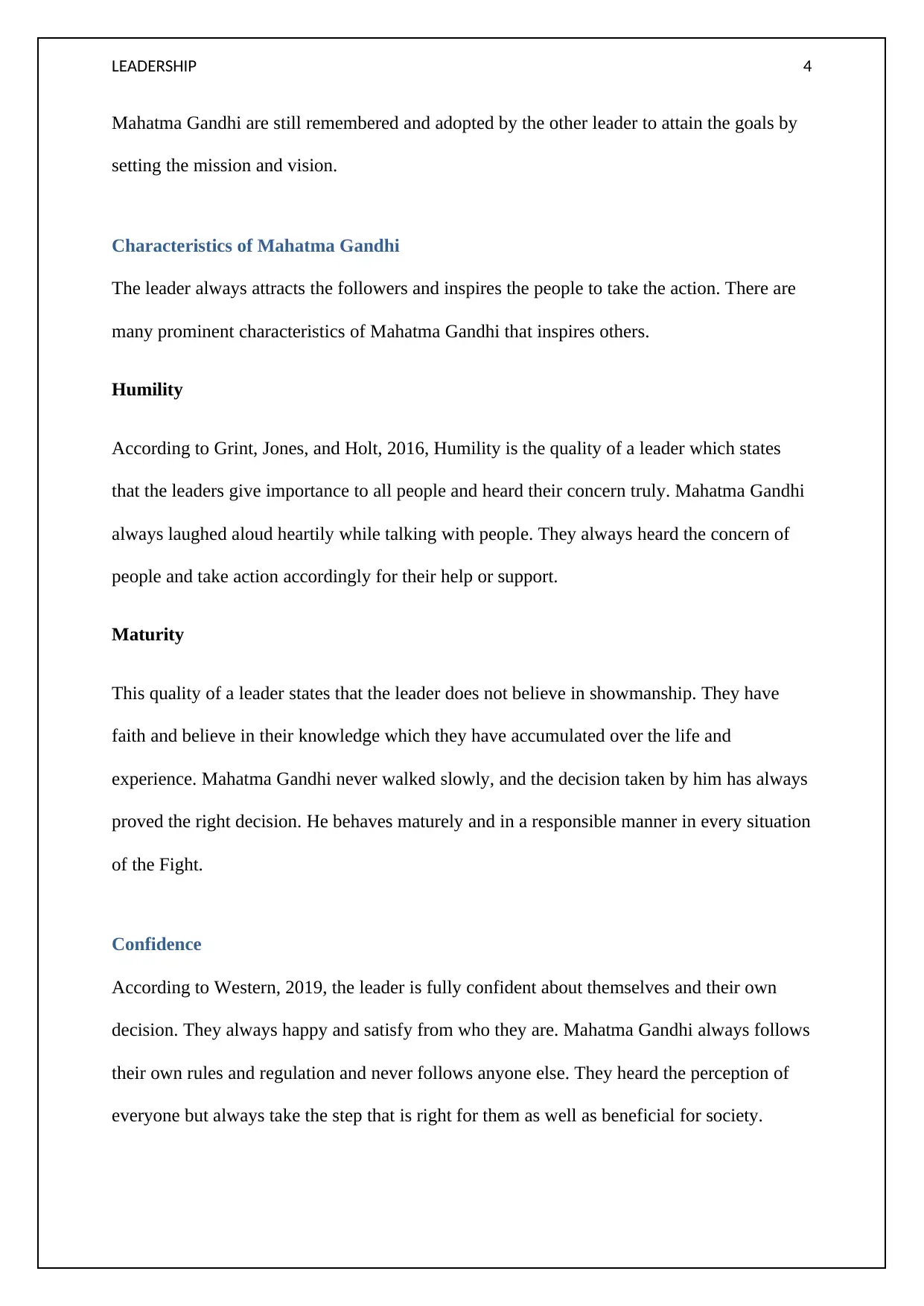
LEADERSHIP 4
Mahatma Gandhi are still remembered and adopted by the other leader to attain the goals by
setting the mission and vision.
Characteristics of Mahatma Gandhi
The leader always attracts the followers and inspires the people to take the action. There are
many prominent characteristics of Mahatma Gandhi that inspires others.
Humility
According to Grint, Jones, and Holt, 2016, Humility is the quality of a leader which states
that the leaders give importance to all people and heard their concern truly. Mahatma Gandhi
always laughed aloud heartily while talking with people. They always heard the concern of
people and take action accordingly for their help or support.
Maturity
This quality of a leader states that the leader does not believe in showmanship. They have
faith and believe in their knowledge which they have accumulated over the life and
experience. Mahatma Gandhi never walked slowly, and the decision taken by him has always
proved the right decision. He behaves maturely and in a responsible manner in every situation
of the Fight.
Confidence
According to Western, 2019, the leader is fully confident about themselves and their own
decision. They always happy and satisfy from who they are. Mahatma Gandhi always follows
their own rules and regulation and never follows anyone else. They heard the perception of
everyone but always take the step that is right for them as well as beneficial for society.
Mahatma Gandhi are still remembered and adopted by the other leader to attain the goals by
setting the mission and vision.
Characteristics of Mahatma Gandhi
The leader always attracts the followers and inspires the people to take the action. There are
many prominent characteristics of Mahatma Gandhi that inspires others.
Humility
According to Grint, Jones, and Holt, 2016, Humility is the quality of a leader which states
that the leaders give importance to all people and heard their concern truly. Mahatma Gandhi
always laughed aloud heartily while talking with people. They always heard the concern of
people and take action accordingly for their help or support.
Maturity
This quality of a leader states that the leader does not believe in showmanship. They have
faith and believe in their knowledge which they have accumulated over the life and
experience. Mahatma Gandhi never walked slowly, and the decision taken by him has always
proved the right decision. He behaves maturely and in a responsible manner in every situation
of the Fight.
Confidence
According to Western, 2019, the leader is fully confident about themselves and their own
decision. They always happy and satisfy from who they are. Mahatma Gandhi always follows
their own rules and regulation and never follows anyone else. They heard the perception of
everyone but always take the step that is right for them as well as beneficial for society.
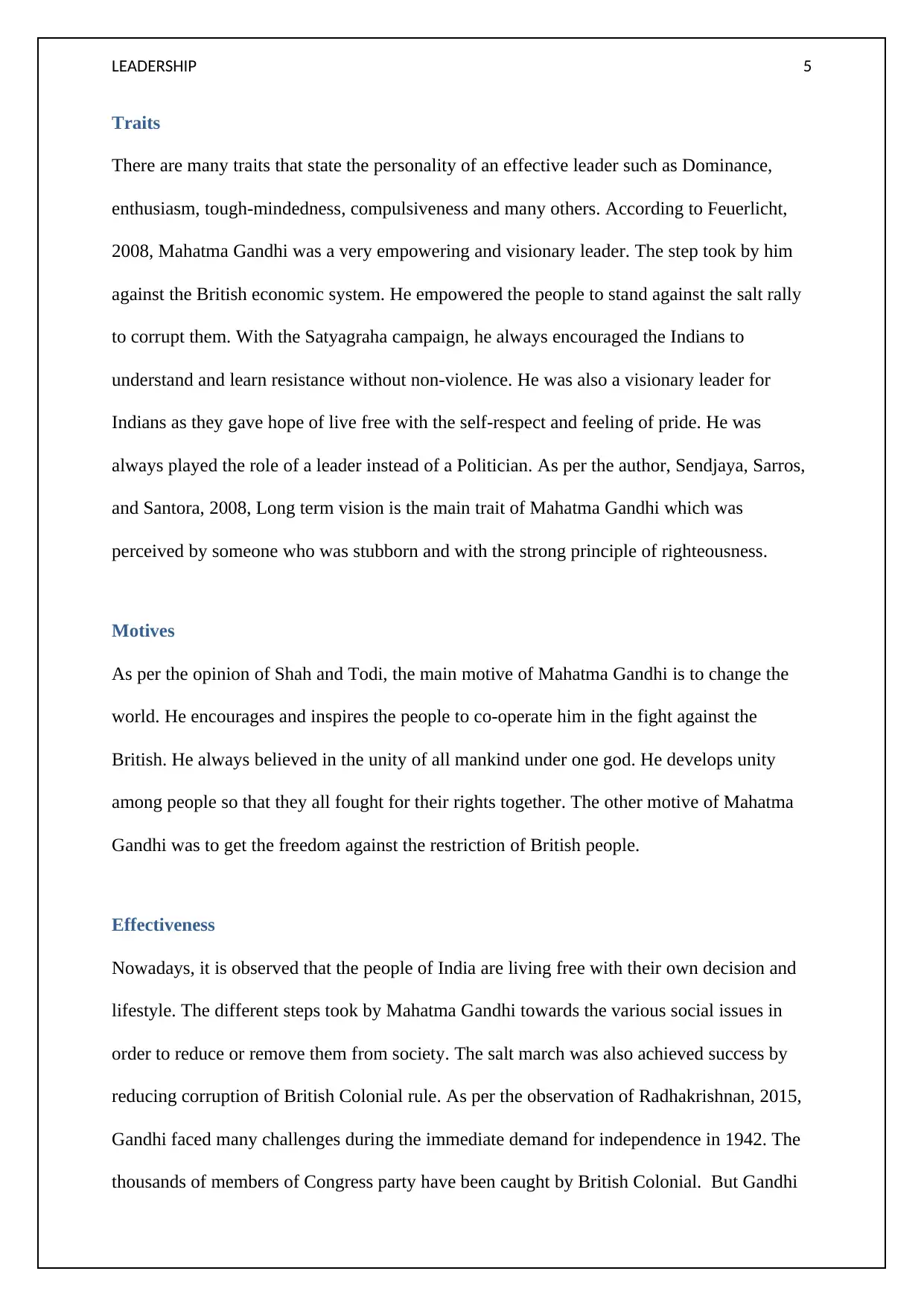
LEADERSHIP 5
Traits
There are many traits that state the personality of an effective leader such as Dominance,
enthusiasm, tough-mindedness, compulsiveness and many others. According to Feuerlicht,
2008, Mahatma Gandhi was a very empowering and visionary leader. The step took by him
against the British economic system. He empowered the people to stand against the salt rally
to corrupt them. With the Satyagraha campaign, he always encouraged the Indians to
understand and learn resistance without non-violence. He was also a visionary leader for
Indians as they gave hope of live free with the self-respect and feeling of pride. He was
always played the role of a leader instead of a Politician. As per the author, Sendjaya, Sarros,
and Santora, 2008, Long term vision is the main trait of Mahatma Gandhi which was
perceived by someone who was stubborn and with the strong principle of righteousness.
Motives
As per the opinion of Shah and Todi, the main motive of Mahatma Gandhi is to change the
world. He encourages and inspires the people to co-operate him in the fight against the
British. He always believed in the unity of all mankind under one god. He develops unity
among people so that they all fought for their rights together. The other motive of Mahatma
Gandhi was to get the freedom against the restriction of British people.
Effectiveness
Nowadays, it is observed that the people of India are living free with their own decision and
lifestyle. The different steps took by Mahatma Gandhi towards the various social issues in
order to reduce or remove them from society. The salt march was also achieved success by
reducing corruption of British Colonial rule. As per the observation of Radhakrishnan, 2015,
Gandhi faced many challenges during the immediate demand for independence in 1942. The
thousands of members of Congress party have been caught by British Colonial. But Gandhi
Traits
There are many traits that state the personality of an effective leader such as Dominance,
enthusiasm, tough-mindedness, compulsiveness and many others. According to Feuerlicht,
2008, Mahatma Gandhi was a very empowering and visionary leader. The step took by him
against the British economic system. He empowered the people to stand against the salt rally
to corrupt them. With the Satyagraha campaign, he always encouraged the Indians to
understand and learn resistance without non-violence. He was also a visionary leader for
Indians as they gave hope of live free with the self-respect and feeling of pride. He was
always played the role of a leader instead of a Politician. As per the author, Sendjaya, Sarros,
and Santora, 2008, Long term vision is the main trait of Mahatma Gandhi which was
perceived by someone who was stubborn and with the strong principle of righteousness.
Motives
As per the opinion of Shah and Todi, the main motive of Mahatma Gandhi is to change the
world. He encourages and inspires the people to co-operate him in the fight against the
British. He always believed in the unity of all mankind under one god. He develops unity
among people so that they all fought for their rights together. The other motive of Mahatma
Gandhi was to get the freedom against the restriction of British people.
Effectiveness
Nowadays, it is observed that the people of India are living free with their own decision and
lifestyle. The different steps took by Mahatma Gandhi towards the various social issues in
order to reduce or remove them from society. The salt march was also achieved success by
reducing corruption of British Colonial rule. As per the observation of Radhakrishnan, 2015,
Gandhi faced many challenges during the immediate demand for independence in 1942. The
thousands of members of Congress party have been caught by British Colonial. But Gandhi
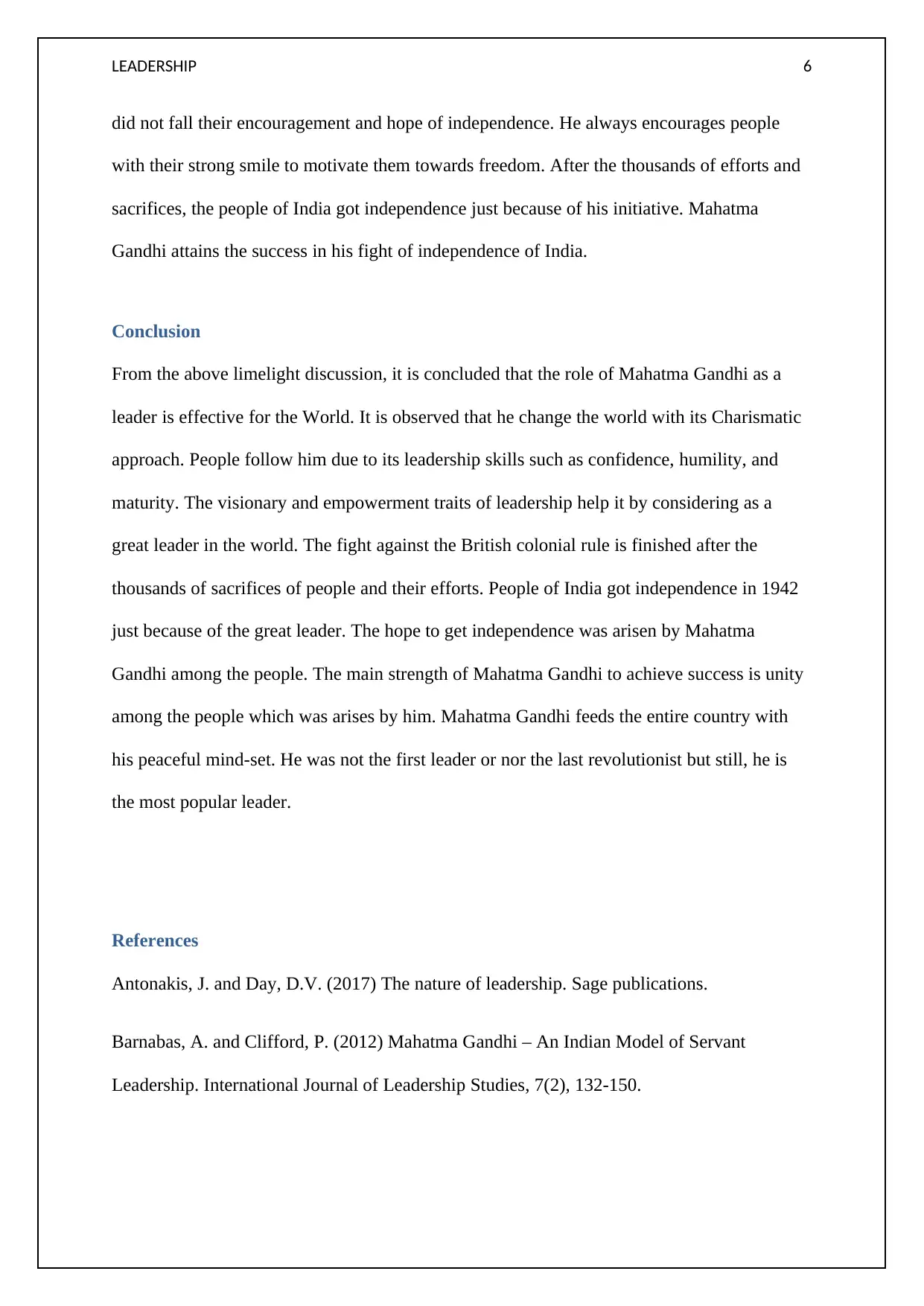
LEADERSHIP 6
did not fall their encouragement and hope of independence. He always encourages people
with their strong smile to motivate them towards freedom. After the thousands of efforts and
sacrifices, the people of India got independence just because of his initiative. Mahatma
Gandhi attains the success in his fight of independence of India.
Conclusion
From the above limelight discussion, it is concluded that the role of Mahatma Gandhi as a
leader is effective for the World. It is observed that he change the world with its Charismatic
approach. People follow him due to its leadership skills such as confidence, humility, and
maturity. The visionary and empowerment traits of leadership help it by considering as a
great leader in the world. The fight against the British colonial rule is finished after the
thousands of sacrifices of people and their efforts. People of India got independence in 1942
just because of the great leader. The hope to get independence was arisen by Mahatma
Gandhi among the people. The main strength of Mahatma Gandhi to achieve success is unity
among the people which was arises by him. Mahatma Gandhi feeds the entire country with
his peaceful mind-set. He was not the first leader or nor the last revolutionist but still, he is
the most popular leader.
References
Antonakis, J. and Day, D.V. (2017) The nature of leadership. Sage publications.
Barnabas, A. and Clifford, P. (2012) Mahatma Gandhi – An Indian Model of Servant
Leadership. International Journal of Leadership Studies, 7(2), 132-150.
did not fall their encouragement and hope of independence. He always encourages people
with their strong smile to motivate them towards freedom. After the thousands of efforts and
sacrifices, the people of India got independence just because of his initiative. Mahatma
Gandhi attains the success in his fight of independence of India.
Conclusion
From the above limelight discussion, it is concluded that the role of Mahatma Gandhi as a
leader is effective for the World. It is observed that he change the world with its Charismatic
approach. People follow him due to its leadership skills such as confidence, humility, and
maturity. The visionary and empowerment traits of leadership help it by considering as a
great leader in the world. The fight against the British colonial rule is finished after the
thousands of sacrifices of people and their efforts. People of India got independence in 1942
just because of the great leader. The hope to get independence was arisen by Mahatma
Gandhi among the people. The main strength of Mahatma Gandhi to achieve success is unity
among the people which was arises by him. Mahatma Gandhi feeds the entire country with
his peaceful mind-set. He was not the first leader or nor the last revolutionist but still, he is
the most popular leader.
References
Antonakis, J. and Day, D.V. (2017) The nature of leadership. Sage publications.
Barnabas, A. and Clifford, P. (2012) Mahatma Gandhi – An Indian Model of Servant
Leadership. International Journal of Leadership Studies, 7(2), 132-150.
Paraphrase This Document
Need a fresh take? Get an instant paraphrase of this document with our AI Paraphraser
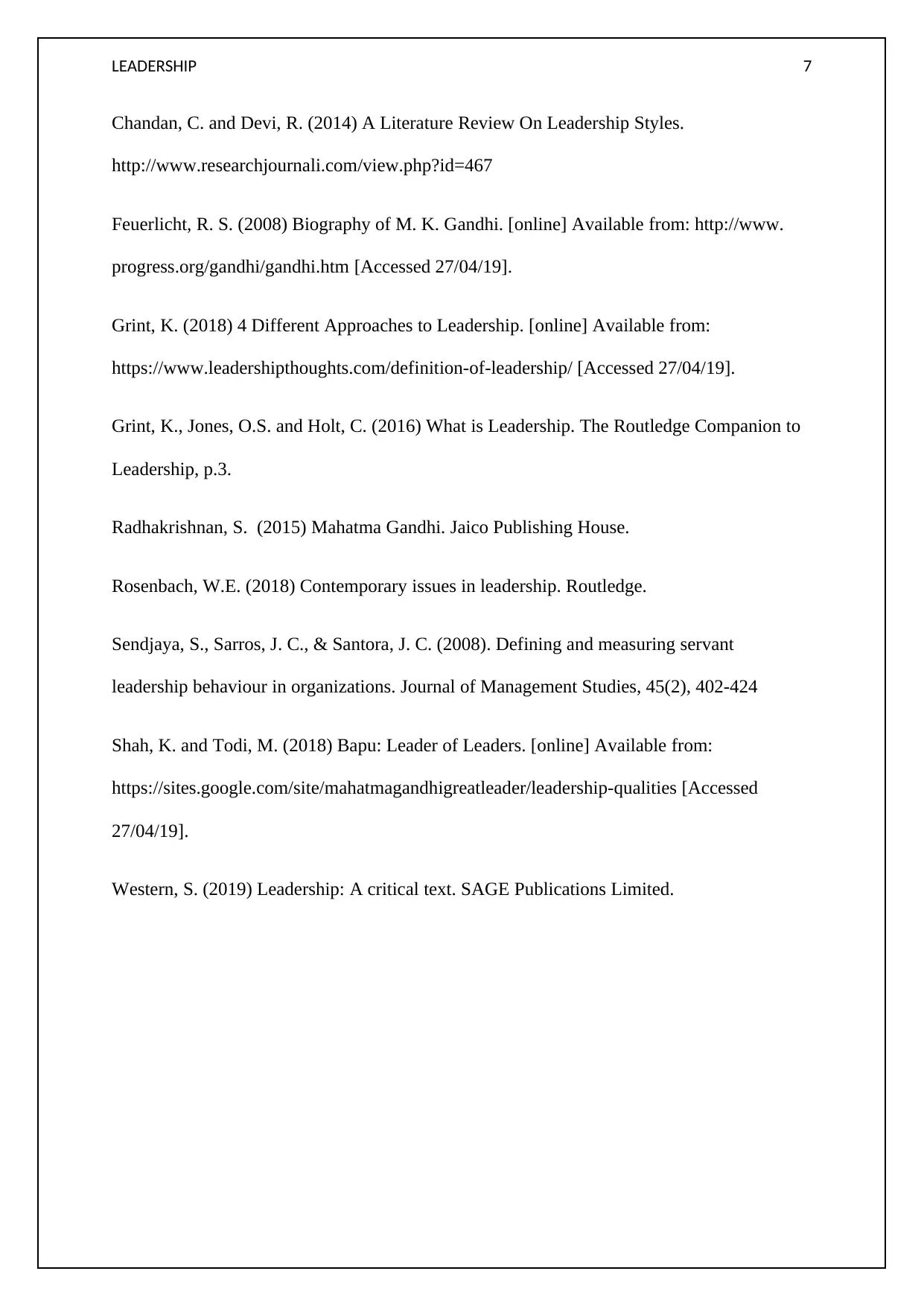
LEADERSHIP 7
Chandan, C. and Devi, R. (2014) A Literature Review On Leadership Styles.
http://www.researchjournali.com/view.php?id=467
Feuerlicht, R. S. (2008) Biography of M. K. Gandhi. [online] Available from: http://www.
progress.org/gandhi/gandhi.htm [Accessed 27/04/19].
Grint, K. (2018) 4 Different Approaches to Leadership. [online] Available from:
https://www.leadershipthoughts.com/definition-of-leadership/ [Accessed 27/04/19].
Grint, K., Jones, O.S. and Holt, C. (2016) What is Leadership. The Routledge Companion to
Leadership, p.3.
Radhakrishnan, S. (2015) Mahatma Gandhi. Jaico Publishing House.
Rosenbach, W.E. (2018) Contemporary issues in leadership. Routledge.
Sendjaya, S., Sarros, J. C., & Santora, J. C. (2008). Defining and measuring servant
leadership behaviour in organizations. Journal of Management Studies, 45(2), 402-424
Shah, K. and Todi, M. (2018) Bapu: Leader of Leaders. [online] Available from:
https://sites.google.com/site/mahatmagandhigreatleader/leadership-qualities [Accessed
27/04/19].
Western, S. (2019) Leadership: A critical text. SAGE Publications Limited.
Chandan, C. and Devi, R. (2014) A Literature Review On Leadership Styles.
http://www.researchjournali.com/view.php?id=467
Feuerlicht, R. S. (2008) Biography of M. K. Gandhi. [online] Available from: http://www.
progress.org/gandhi/gandhi.htm [Accessed 27/04/19].
Grint, K. (2018) 4 Different Approaches to Leadership. [online] Available from:
https://www.leadershipthoughts.com/definition-of-leadership/ [Accessed 27/04/19].
Grint, K., Jones, O.S. and Holt, C. (2016) What is Leadership. The Routledge Companion to
Leadership, p.3.
Radhakrishnan, S. (2015) Mahatma Gandhi. Jaico Publishing House.
Rosenbach, W.E. (2018) Contemporary issues in leadership. Routledge.
Sendjaya, S., Sarros, J. C., & Santora, J. C. (2008). Defining and measuring servant
leadership behaviour in organizations. Journal of Management Studies, 45(2), 402-424
Shah, K. and Todi, M. (2018) Bapu: Leader of Leaders. [online] Available from:
https://sites.google.com/site/mahatmagandhigreatleader/leadership-qualities [Accessed
27/04/19].
Western, S. (2019) Leadership: A critical text. SAGE Publications Limited.

LEADERSHIP 8
1 out of 9
Related Documents
Your All-in-One AI-Powered Toolkit for Academic Success.
+13062052269
info@desklib.com
Available 24*7 on WhatsApp / Email
![[object Object]](/_next/static/media/star-bottom.7253800d.svg)
Unlock your academic potential
© 2024 | Zucol Services PVT LTD | All rights reserved.





